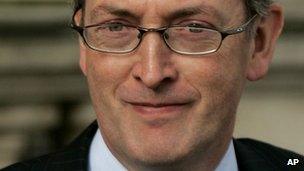The feeling is mutual
- Published
- comments

Could the government really model itself on the cooperative John Lewis?
The world, we are told, is watching us. There is, apparently, global excitement at the launch today of MyCSP Ltd - "the first 'John Lewis style' business created from a central government service", according to the Cabinet Office press release.
Well, I can't speak for Afghanistan or Zimbabwe (or any of the other countries in between), but I can tell you that the topic of conversation at my bus stop this morning was not the mutualisation of Britain's civil service pension scheme.
So when Cabinet Minister Francis Maude says that government is "transforming a neglected back-office operation into a new competitive and responsible business - the rest of the world is watching", what is he on about?
Ministers always get a trifle obsessive about the mechanisms of government because one of the first things civil servants tell them is that, whatever fancy ideas they might have for reforming the country, most of the levers you pull in Whitehall are not connected to anything.
Tony Blair famously revealed how, after two years in government, he bore "the scars on my back" from trying to introduce public sector reform. Finding novel and effective ways to improve the delivery of public services lies at the heart of ministerial thinking in the current coalition government, just as it was with New Labour.
The argument is usually cast like this: centralised state monopolies are bureaucratic and inefficient (think grim Soviet-style central planning); privatised public services put profit before people (think corporate fat-cats feeding off the poor old taxpayer).
What is needed, the theory goes, is a new model that retains the ethos of public good but with the quality and efficiency associated with successful competitive markets. Enter John Spedan Lewis.
JS Lewis's book Partnership for All: A Thirty-four Year Old Experiment in Industrial Democracy may currently reside at 3,513,740 in the Amazon bestseller list, but the ideas within it are white-hot in Whitehall.
He founded the John Lewis Partnership, arguably Britain's favourite department store, a business owned by its employees. Profits are spread among the workforce as an annual dividend, agreed by a board of trustees.
The model, known as a mutual, is credited with high levels of staff loyalty, enthusiasm and innovation. Employees are said to put the partnership before profit: in 1999 it was suggested the business might be demutualised and floated on the stock market, with a guaranteed a windfall of up to £100,000 for each staff member. The proposal was swiftly and resoundingly dismissed.

Former Labour Cabinet minister Lord Hutton is MyCSP Ltd's chairman
It is easy to see why ministers might be drawn to the John Lewis model: the motivation of the business is not short-term profit but the long-term benefit of those who work for it. If only it could be adapted for the public sector, mixing business efficiency and growth with a philosophy of public good.
Today, ministers unveiled what they say is the answer to that - MyCSP Ltd. The civil service pension scheme has a new funky name and a new structure.
"We no longer face a binary choice between public services delivered by state monopoly and straight privatisation," Francis Maude said today.
But is this new model really as radical as ministers like to claim? Or is it more of a committee camel - a hybrid of ideas stuffed into a creature christened "compromise".
Unlike John Lewis, MyCSP Ltd is only 25% owned by its employees. Full 40% is controlled by a private business services company and the remaining 35% stake is retained by the government.
This is where you end up when you try to use the profit motive to do the quality and efficiency thing without the self-interest or greed thing.
The taxpayer keeps a stake just in case the business really starts to make money and voters start to resent someone else profiting from their asset. The private sector needs a sizeable chunk to encourage share-holders and investors. The employees get a portion - but appear to be the junior partners in this partnership.
Will it be enough to generate the kind of loyalty and service one sees at John Lewis? It is an interesting question but one, I suspect, that is not yet on the lips of people in Kabul, Harare or at my bus stop.